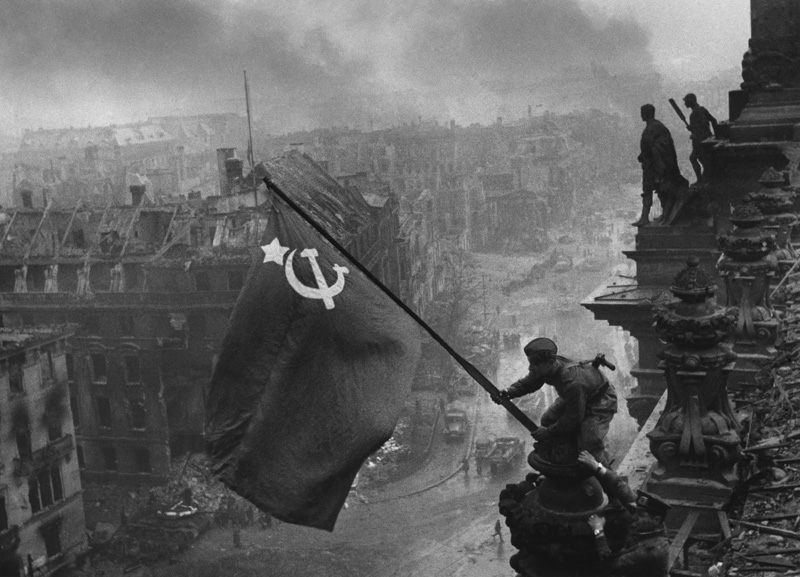While European leaders debate on punishing Russia for its actions in the Crimea and perhaps its interference in the east of Ukraine, many Germans feel the key is not to ruffle Russian feathers.
On a wall of the office of the left-wing MP, Jan van Aken, there is a very big, framed black-and-white picture.
It is a classic image of a Red Army soldier precariously balancing on the turret of the old Reichstag building. He’s raising the hammer and sickle banner against the smouldering ruins of Berlin in the background.
Asked why he had it on his wall in the German parliament? Jan van Aken replied with a chagrin that it was taken on his birthday, 1 May, and then he added more seriously that it tells a story.
The Russians were liberators, he said. They rescued Berlin and Germany from the Nazis.
He doesn’t diminish the contribution of others like the British from the west, but he makes it clear that the Red Army liberated Germany. Simple.
But the picture he uses to commemorate this event – and he’s the first to admit it – tells a more complicated story than catches the eye.
The actual event of the taking of the picture – the raising of the red banner on the Reichstag – happened on 30 April, the same day Hitler is said to have committed suicide in his bunker, about half a mile away.
The picture had to be re-staged on May 1, because the soldier raising the flag had an arm full of the spoils of war – wrist-watches.
The soldiers had to climb back up with the flag, their arms now clean of watches to retake the picture that is now a classic in Germany and in Russia.
The population in East Germany was liberated and the Russians stayed there for more than a half a century before the collapse of the Berlin wall.
More important, the picture shows why many Germans today are ambivalent about what’s happening in Ukraine.
Van Aken is an MP for Die Linke, the party descended from the old communist party in East Germany.
He says many of his fellow party members remain grateful to the Soviet Union for beating the Nazis back to Adolf Hitler’s bunker.
However, in the west of the country where anti-communism was rife, Russia was not only the liberator but also a new oppressor; the irony.
The signs of that liberation for many Germans are there for all to see, even in the Bundestag building itself where graffiti scrawled by Russian soldiers, in the Cyrillic script has not been scrubbed away.
It is there for MPs to see as they enter the chamber, the names of soldiers with dates in May, 1945.
The soldiers who raised the flag came down and did what soldiers do – they wrote their names on the walls they’d breached. One of the soldiers who raised the flag was Ukrainian, from Kiev.
Young East Germans, like Angela Merkel, studied Russian in addition to German in school.
We will never know if she accidentally bumped into KGB agent Putin, who was stationed in Dresden, but she’s certainly bumping into him now.
Berlin feels a lot closer Moscow than they feel any ties with London or Washington. Of course, it is nearer, but it is also emotionally closer.
Politicians – like the former chancellor Helmut Schmidt, now in his mid-90s and still, by the way, smoking furiously even in television studios – are unequivocal in their commitment to democracy in Ukraine.
But Mr Schmidt is also of the view that NATO has no business inching closer and closer towards Russia’s borders. Sanctions, he said, were “nonsense”. Germany has to do business with Russia, is the common sentiment, so let’s remember that.
The same sentiment comes from another former Chancellor, Gerhard Schroeder, though in his case he really does do business with Russia as the chairman of the board of Nordstream, owned by Gazprom, the Russian energy company currently in dispute with Ukraine.
Apart from Chancellor Merkel’s predecessors, a string of very powerful German businessmen are lining up to say how important Russia is, from the boss of Siemens, often pictured with President Putin, to the chief executives of Adidas and of the steel giant Thyssen Krupp.
A short distance from the Bundestag there is a grand Soviet memorial to those killed liberating Berlin. It is in need of some loving attention. Some of the letters on the inscription have fallen off – the “V” in soviet has gone, for example.
On top of the columns is a huge statue of a Red Army soldier, gazing down at anyone bold enough to look up at him.
“Gazing” is an understatement, he’s actually staring. He may be inert and bronze, but one can only admit that they find it hard to look him straight in his fierce eyes.
He seems to be saying: “I spilled my blood and that of my brothers ans sisters for you. Don’t you ever forget that.”










